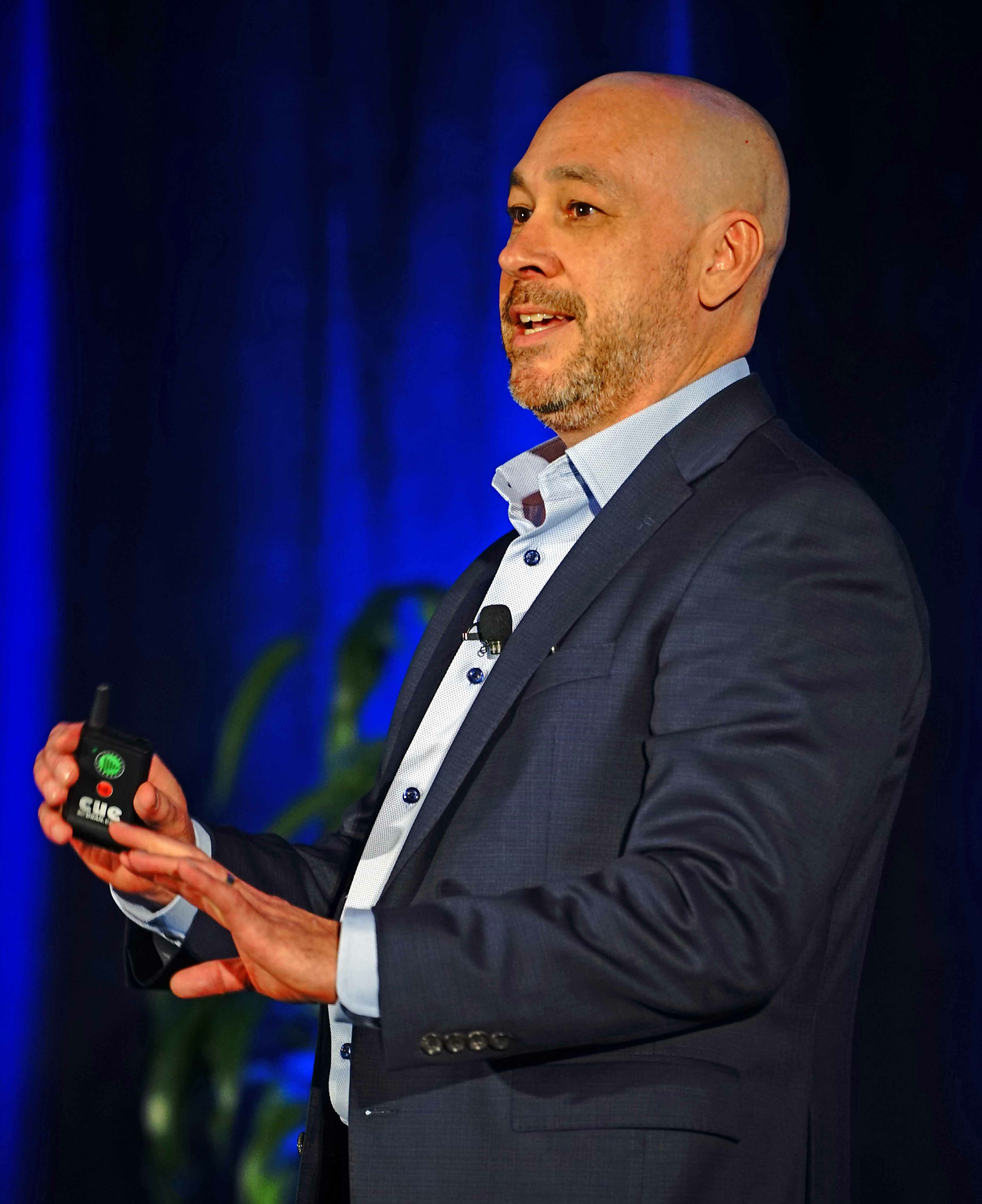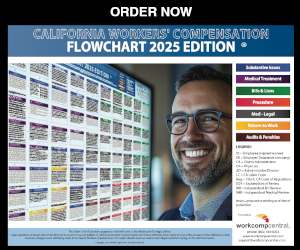News Articles
Thursday, June 12, 2025
Crackdown on Tech in Workplace Could Hit Comp
- State: California
- Topic: Top
- - Popular with: Legal
- - 0 shares
ANAHEIM, Calif. — Bills aiming to regulate how employers use technology to monitor employees and requiring disclosure of automated decision-making systems could have unintended consequences for California’s workers’ compensation system.

Jason Schmelzer, a CCWC lobbyist, speaks during
the conference on Wednesday
in Anaheim.
A bill that would establish when and where workplace surveillance is appropriate included a provision that could have hampered fraud investigations by prohibiting employers from monitoring their workers at home, according to Jason Schmelzer, a lobbyist for the California Coalition on Workers’ Compensation.
What’s more, Schmelzer said during the CCWC 21st annual Conference and Legislative and Educational Forum that representatives for the author of AB 1331 said they had no intention of amending the bill.
“I went to the office, talked to a staffer and said, 'Did you intend to do this? The bill doesn’t seem like it’s about us,’” Schmelzer said. “They said, ‘No, we did not intend to do that, but we’re not going to fix it.'”
AB 1331 was heavily amended before the Assembly voted 55-15 to pass it June 5. And another bill that focused more on how surveillance tools are used, AB 1221, died in the Assembly appropriations committee.
“The bills at this point are relatively neutered, but this is not an issue that’s going to go away,” Schmelzer said. “Whatever success we’ve had pushing back on these bills this year doesn’t prevent them from bringing the bills back in coming years. And outside of the surveillance issue, one of the biggest workers’ comp-related aspects of this is that there’s a lot of technology that’s used to keep people safer.”
Schmelzer also warned about AB 1018, which would generally regulate the use of automated decision-making systems. The bill would require entities to disclose the use of automated decision systems, allow people to opt out and provide a way to appeal adverse determinations.
He described the bill as an “overreach,” saying it would apply anytime an entity uses a machine to make a decision that a human used to make, and the decision impacts another person in some critical way.
“It’s that broad,” Schmelzer said. “So if you use a computer to do the first cut on medical treatment, you have to disclose that and give people the choice of whether to use that tech.”
He said the requirements in the bill are not conducive to efficiently processing claims.
“It’s not exactly workers’ comp policy, but to the extent we use technology to make decisions faster to deliver benefits faster, I think the Legislature should make room for that type of thing,” Schmelzer added.
Schmelzer also discussed efforts to reform the Subsequent Injuries Benefits Trust Fund.
AB 1329 would require that, to receive benefits from the SIBTF, substantial evidence of a preexisting condition that predates a second injury and caused an earnings loss must be shown. It would also require the Division of Workers’ Compensation to create a database of qualified medical evaluators with experience assessing second injury claims. And it would require parties to SIBTF cases to obtain medical-legal evidence the same way they do in other comp cases.
Schmelzer characterized the bill as the “sort of bill you put out if you don’t want real reform.” He said CCWC is opposed to the bill and is considering amendments to propose.
However, Gov. Gavin Newsom acknowledged the ballooning costs associated with the SIBTF in his latest budget proposal in May. The governor said in his latest budget proposal that without changes to the program, claim payments are expected to increase from $87 million in 2019-2020 to $1.3 billion in 2023-2030. The governor projects the assessments levied on employers to pay for the program would increase from $112 million to $1.5 billion over that same period.
Schmelzer noted that Newsom, in his budget statement, acknowledges that 18 other states have eliminated their version of a second injury fund. He said that from the perspective of employers, the next step is to see what the governor does with the final budget.
He also talked about AB 1293, a CCWC-sponsored bill that would make several changes to the medical-legal process.
The bill would require the DWC to create templates to request a qualified medical evaluator and for QME reports, and it would require the division to publish annual reports covering the quality of medical-legal reports each year.
Schmelzer said the idea with templates is to provide some resources that could make the process work better, produce better reports and lead to quicker resolution of problems.
The proposal to start publishing annual reports on med-legal report quality arises from what Schmelzer described as “trying to will current law into effect.”
The division is required to analyze the quality and completeness of reports each year, but it’s an unfunded mandate.
“They tried to do this with volunteers, but frankly, the Legislature hasn’t provided them with resources to do it,” he said.
The CCWC 21st annual Conference and Legislative and Educational Forum at Disney’s Grand Californian Hotel concludes Friday.
Today’s News
- Ohio - Supreme Court Says Widow Can't Get Schedule Loss Compensation as Surviving Spouse Top 06/13/25
- Calif. - 3rd DCA Publishes Decision That Erroneous Evidentiary Rulings Aren't Reviewable for Harmlessness WEST 06/13/25
- N.Y. - Court Upholds Establishment of Worker's Claim for Fall Injuries NORTH 06/13/25
- N.Y. - Worker Injured by Pulley System Gets Summary Judgment on Labor Law Claims NORTH 06/13/25
- Calif. - Senate Committee Passes State Hospital Worker Presumption WEST 06/13/25
- Ntl. - CMS Hosting Webinar on Introduction to Set-Asides NATIONAL 06/13/25
Advertisements
Now Trending
- Workers' Compensation News
-
Calif. Crackdown
on Tech in Workplace Could Hit…
Posted on Jun 12, 2025
-
Calif. Attorney
Tom Girardi Sentenced to 87 Months
for Stealing From…
Posted on Jun 6, 2025
-
Calif. Hospital
Presumption, Bill Review and Fraud
Reporting Measures…
Posted on Jun 6, 2025
-
Calif. 3rd DCA
Publishes Decision That Erroneous
Evidentiary Rulings Aren't…
Posted on Jun 13, 2025James Witkop says: “Another case that was published via the efforts of the California Lawyers…”
-
Calif. Court
Publishes Decision Applying
Sovereign Immunity to Tribal Health
Care…
Posted on Jun 11, 2025
-
Alaska Supreme
Court Revives Worker's Maritime
Tort Claims for Accident on…
Posted on Jun 10, 2025
-
Calif. Senate
Committee Passes State Hospital
Worker…
Posted on Jun 13, 2025
-
Maine Supreme
Judicial Court Says Worker Did Not
Timely File Petition to Restore…
Posted on Jun 6, 2025
-
Ohio Supreme Court
Says Widow Can't Get Schedule Loss
Compensation as Surviving…
Posted on Jun 13, 2025
-
Ntl. CMS Hosting
Webinar on Introduction to…
Posted on Jun 13, 2025
Jobs
Upcoming Events
Jun 11-13, 2025
CCWC 2025 Educational Conferen
For two decades, CCWC has assembled the key players in the workers’ compensation arena for what is …
Jun 14-28, 2025
2025 Legal Specialization Test
Course Description: This 3-part series instructed by experienced workers’ compensation attorney an …
Sep 2-4, 2025
San Diego Elevate Workers' Com
We are thrilled to announce that Early Bird registration is OPEN for ELEVATE® 2025! This year's …
Social Media Links
c/o Business Insurance Holdings, Inc.
Greenwich, CT 06836






No Comments
Log in to post a comment